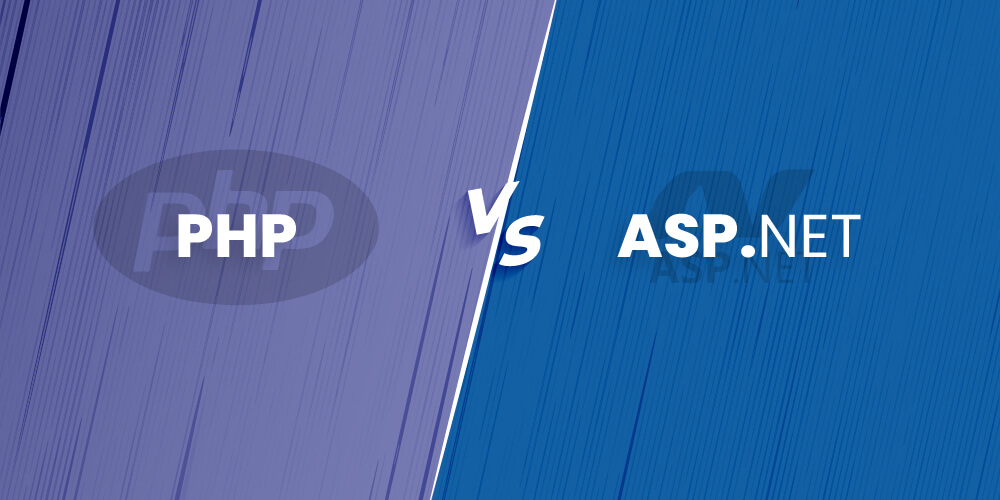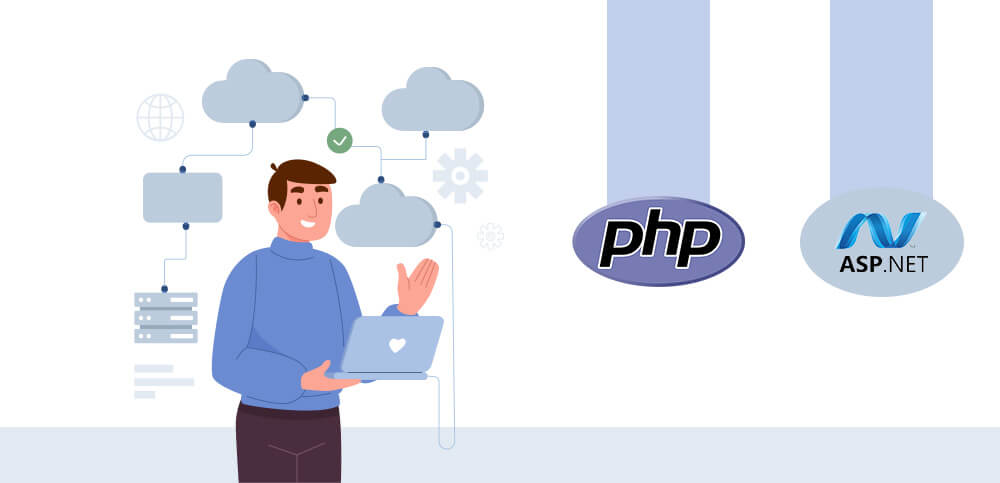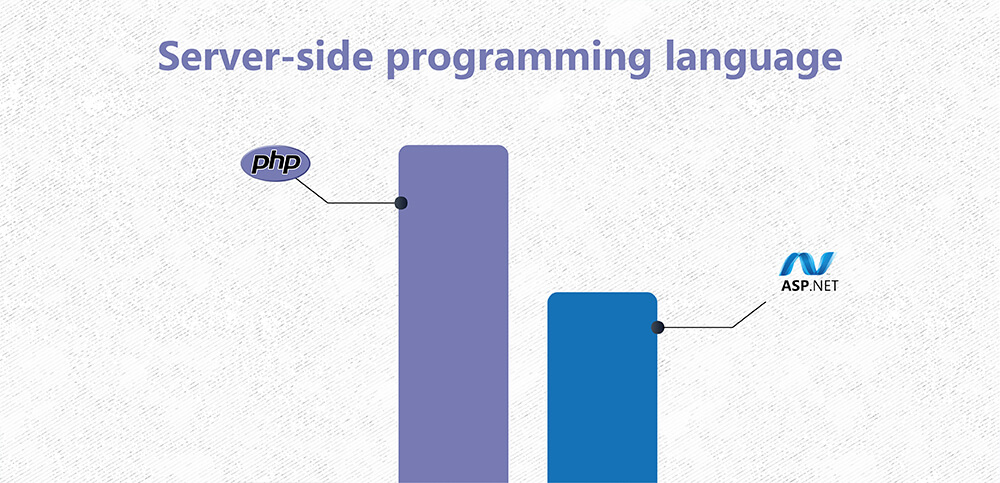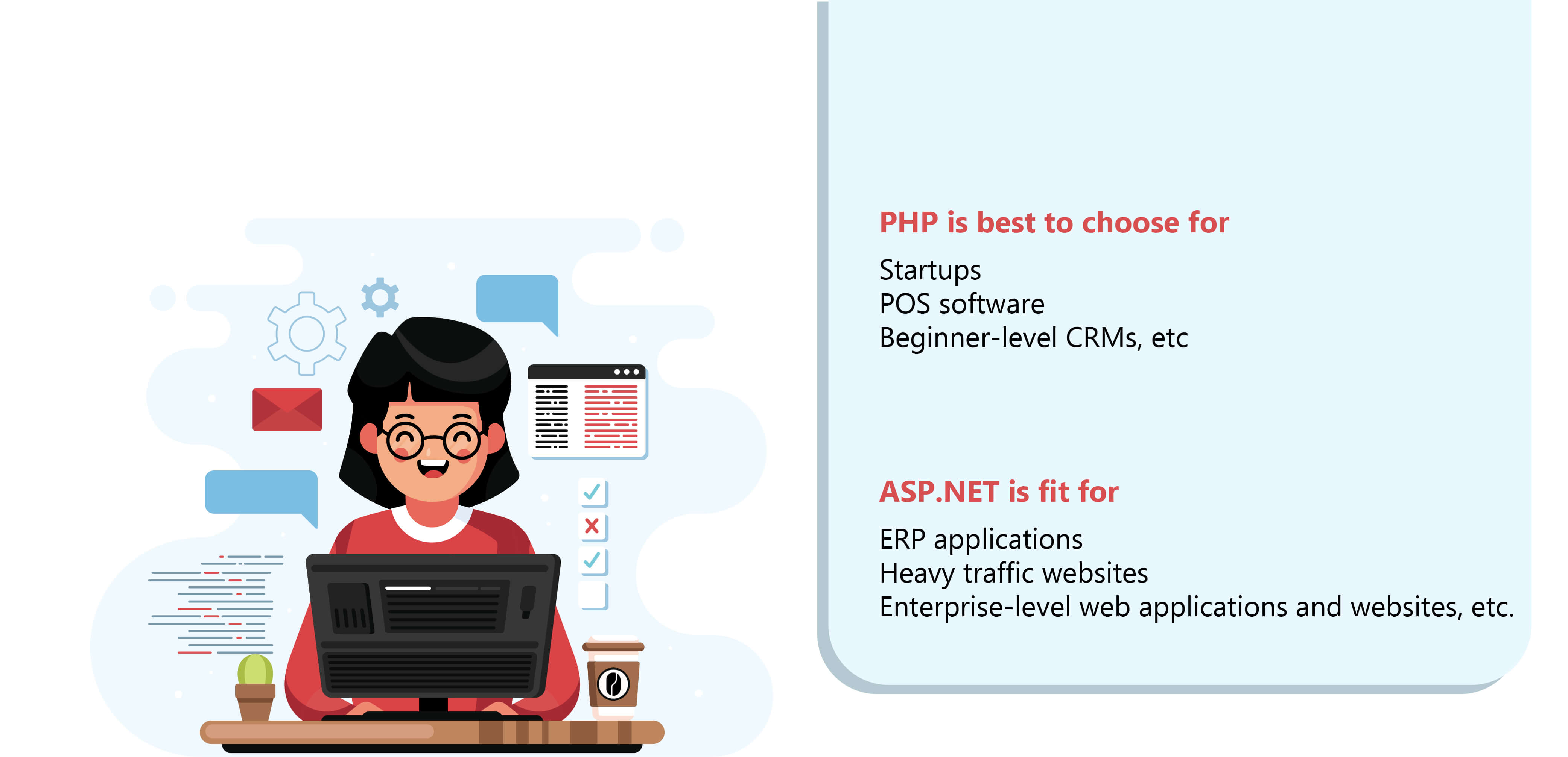PHP VS ASP.NET: Picking the Right Tech Stack for Your Next Project
Table Of Content
Published Date :
22 Jul 2024
PHP and ASP.NET are the two prominent back-end technologies. And, differentiating between the two in order to choose the right one for your next project is quite an arduous task. On one side, there is PHP, one of the most popular programming languages for web development with a thriving community of PHP developers. On the other side, we have ASP.NET, a robust Microsoft platform and a C# based framework with endless opportunities for web development. But, which one should you choose for your upcoming project?
Let’s drill down!
Before we discuss the key differences between the two, let’s first understand both technologies in brief.
A Brief About PHP and ASP.NET

PHP
PHP is a popular server-side and most-liked scripting language for creating dynamic web applications or websites. PHP can be embedded into HTML code and executed with a command line interface or can be used in combination of other web frameworks. Thanks to its advanced features, PHP can also be used for programming tasks other than web context, like graphical applications.
Below are some of the top features of PHP:
- Server-side scripting language embedded with HTML.
- Highly scalable.
- Huge community of dedicated PHP developers.
- Comes with numerous open-source libraries, tools and extensions.
- PHP supports database systems, including MySQL, PostgreSQL, Microsoft SQL Server, etc.
- PHP is compatible with major operating systems, like Linus, macOS, Windows, etc.
ASP.NET
ASP.NET is a server-side web application framework developed by Microsoft to create dynamic web pages. The best thing is, Microsoft keeps on rolling out new features and updates to assist ASP.net developers in building a scalable web application that delivers high performance. One can use multiple languages, like C#, Visual Basic.Net, JavaScript, etc. to write ASP.NET applications.
Some of the features of ASP.NET are:
- ASP.NET Core and Kestrel web service contribute to high performance of ASP.NET.
- Cross-platform or compatible with all operating systems.
- ASP.NET applications can be deployed on a variety of servers.
- Provides built-in support for AJAX, which allows app developers to create interactive web apps.
- Provides a bunch of APIs and many additional features to further ease the work for developers.
Need a Robust Web Application? Choose Your Tech Stack Wisely with DITS! Whether you prefer PHP or ASP.NET, our expert developers have you covered. Let's build something amazing together!
PHP VS ASP.NET : A Brief Comparison
Both technologies have existed in the market for a long time and have been used for creating scalable web applications. But, the question still remains: Which platform to choose for developing web apps for your next project? On one hand, PHP is a free and open-source platform, and on the other hand, ASP.NET is a powerful platform managed by Microsoft.
Further, PHP is a combination of a programming language and web framework, whereas .NET is a cross-platform web app framework. Thus, making a choice between the two technologies corresponds to the project’s ongoing needs, i.e., the project’s requirements or functionalities needed to build a web application.
So, whether you should hire dot net developers or PHP developers, it requires you to go through a detailed comparison between PHP and ASP.NET on different parameters.
A Detailed Comparison Between PHP and ASP.NET

| Feature | PHP | ASP.NET |
| Development Language | PHP (Hypertext Preprocessor) | Primarily C#, also supports VB.NET, F# |
| Platform | Open-source, cross-platform | Primarily Windows, cross-platform via .NET Core |
| Cost | Free | Free with the .NET Core, Windows Server license for ASP.NET |
| Performance | Can be less efficient for very large applications | High performance, especially with ASP.NET Core |
| Ease of Learning | Easier for beginners | Steeper learning curve due to complexity |
| Flexibility | Highly flexible, suitable for various types of applications | Less flexible due to stricter coding standards and structure |
| Community Support | Large, active open-source community | Strong community support, backed by Microsoft |
| Library/Framework Support | Extensive libraries and frameworks (Laravel, Symfony, etc.) | Extensive libraries and frameworks (Entity Framework, MVC, etc.) |
| Integrated Development Environment (IDE) | Multiple options (PHPStorm, VS Code, Sublime Text) | Best experience with Visual Studio |
| Security | Requires careful handling of security practices | Built-in security features, enhanced in ASP.NET Core |
| Speed of Development | Fast development due to simplicity and flexibility | Can be slower due to more complex setup and architecture |
| Scalability | Scalable, but might require more manual handling | Highly scalable, especially with ASP.NET Core |
| Database Support | Supports numerous databases (MySQL, PostgreSQL, etc.) | Supports numerous databases (SQL Server, MySQL, PostgreSQL, etc.) |
| Hosting | Widely supported by most hosting providers | Requires Windows hosting or Docker for Linux |
| Integration | Good for integrating with various technologies | Excellent for integrating with Microsoft technologies |
| Deployment | Simple and fast with numerous deployment options | More streamlined with DevOps and continuous integration using Azure |
| Examples of Use | Facebook (initially), WordPress, Wikipedia | Stack Overflow, Microsoft websites, DELL |
Statistics
According to a survey, among all the websites with a server-side programming language, 78.9% are PHP-powered and 9.7% are powered by ASP.NET. Further, talking of market position also, PHP seems to rule the list.
While ASP.NET seems to lag behind, market position is not the only deciding factor. There are many other factors that need to be considered while selecting a programming language or a web development framework.
Scalability
Measuring from a scalability viewpoint, both PHP and ASP.NET are equal. However, the scalability of an application depends more on the tech complexity, and PHP has fewer learning complexities as compared to ASP.NET. Thus, PHP can be a good choice for startups.
Remember: Whether you choose PHP or ASP.NET, the focus should be on the skill and experience of the developers. With our dedicated development team on your side, you can make your website or application more scalable, no matter the tech stack you choose.
Performance
There is a myth that programming language or framework determines the performance of an application. But, the truth is, the performance of a framework depends on the way coding is done. ASP.NET performs better than PHP though. Reason? ASP.NET allows parallel programming which allows codes to run simultaneously. However, PHP does not support threading.
PHP vs ASP.NET: Performance
| Parameters | PHP | ASP.NET |
| Speed | PHP is lightweight and can run efficiently on most web servers. | ASP.NET is compiled which can lead to faster execution and better performance in some scenarios. |
| Scalability | PHP applications can be scaled effectively with proper architecture and design. | ASP.NET is known for its scalability, especially for large enterprise-level applications. |
| Concurrency | PHP supports concurrency, but achieving high concurrency might require additional setup (e.g., Nginx, HHVM). | ASP.NET handles concurrency efficiently with built-in support for asynchronous programming and threading. |
| Memory Usage | PHP generally has lower memory usage, which can be beneficial for smaller applications. | ASP.NET might use more memory due to its extensive features and libraries, but this can benefit larger projects. |
| Performance Tuning | Performance in PHP can be tuned with tools like OpCache, Memcached, and other caching techniques. | ASP.NET offers a range of performance tuning options, including JIT compilation and various caching mechanisms. |
| Development Speed | PHP allows for rapid development and deployment, making it suitable for small to medium-sized applications. | ASP.NET, with its robust framework and tools, can be quicker for large-scale applications despite a steeper learning curve. |
| Server Performance | PHP runs on a wide range of web servers (Apache, Nginx, etc.), offering flexibility in server performance. | ASP.NET typically runs on IIS, which is tightly integrated with Windows, providing optimized server performance. |
| Database Integration | PHP integrates well with various databases, particularly MySQL, enhancing performance with optimized queries. | ASP.NET integrates seamlessly with SQL Server, benefiting from optimized performance in Windows environments. |
PHP or ASP.NET? Whichever You Choose, DITS Ensures Success! Hire our expert developers to build secure, scalable, and efficient web applications. Let's discuss your project today!
Security
One big difference between ASP.NET and PHP is the security options they provide. ASP.NET has built-in security features, like SQL injection. In simple words, ASP.NET automates the work, whereas PHP provides you with tools to accomplish a task. Thus, ASP.NET is the right choice when it comes to security.
PHP vs ASP.NET: Security
| Features | PHP | ASP.NET |
| Built-in Security Features | PHP has basic built-in security features, but often relies on external frameworks and libraries for enhanced security. | ASP.NET has robust built-in security features, including built-in protection against SQL injection, cross-site scripting (XSS), and cross-site request forgery (CSRF). |
| Community Support for Security | Large community support with numerous resources for addressing security vulnerabilities, but practices can vary widely. | Strong support from Microsoft and the .NET community, with regular security updates and patches. |
| Regular Updates | Regular updates are provided, but the responsibility for implementation often falls on the developer. | Regular and consistent updates from Microsoft, with a focus on security patches and enhancements. |
| Error Handling | Basic error handling features, but requires proper configuration and coding practices to avoid security risks. | Advanced error handling mechanisms that provide more secure and informative error messages. |
| Authentication and Authorization | Authentication and authorization are implemented through various third-party libraries and frameworks. | Comprehensive built-in authentication and authorization frameworks, such as ASP.NET Identity. |
| Data Protection | Requires third-party solutions for data encryption and protection. | Built-in data protection features, including data encryption and secure storage mechanisms. |
| Compliance | Compliance with security standards can be achieved, but often requires additional configuration and tools. | Easier to achieve compliance with security standards (e.g., HIPAA, GDPR) due to built-in features and Microsoft’s enterprise focus. |
| Code Vulnerabilities | Code vulnerabilities are common due to the flexibility and diverse coding practices in the PHP community. | Fewer code vulnerabilities due to stricter coding practices and guidelines enforced by the ASP.NET framework. |
| Security Best Practices | Relies on developers following best practices and using secure coding standards. | Enforces security best practices through framework design and integrated tools. |
Community Support
PHP is open-source and boasts a vibrant community of developers who post regularly on forums to assist fellow developers in solving a problem. Further, PHP has a larger support community than ASP.NET as it is free. But, this is not the one and only thing to say about community support. ASP.NET also enjoys a robust community of dedicated developers who offer support and come up with great solutions to challenges faced by their peers during web application development.
Cost
Well, this is the only arena where PHP comes up as a clear winner because it is an open-source development framework. You can easily find thousands of PHP resources to work with for free. On the other hand, ASP.NET comes with a web hosting fee. Given the functionality and array of features .NET offers, the fee should not deter you from using it. Further, if you are already leaning towards ASP.NET for your next web app development project, you can outsource .net development to offshore developers.
PHP vs ASP.NET: Cost comparison
| Features | PHP | ASP.NET |
| Licensing Costs | PHP is open-source and free to use, with no licensing fees. | ASP.NET is free to use, but some enterprise features and tools (like Visual Studio) may have costs. |
| Development Costs | Generally lower due to a larger pool of PHP developers and the availability of many free tools and frameworks. | Potentially higher due to the specialized nature of .NET developers and costs associated with Microsoft tools. |
| Hosting Costs | PHP can be hosted on a variety of platforms, including many cost-effective Linux-based hosting solutions. | ASP.NET typically requires Windows-based hosting, which can be more expensive than Linux-based options. |
| Infrastructure Costs | Lower infrastructure costs due to the ability to run on less expensive servers and the flexibility of open-source tools. | Higher infrastructure costs due to the requirement of Windows servers and enterprise-grade infrastructure. |
| Maintenance Costs | Lower maintenance costs with a vast community and extensive documentation available for troubleshooting. | Maintenance costs can be higher due to the need for specialized knowledge and potentially higher-priced support services. |
| Training Costs | Training costs are generally lower as PHP is widely taught and has a large number of free resources available. | Higher training costs as ASP.NET might require specific training on Microsoft technologies and tools. |
| Tooling and Add-ons | Many free or low-cost tools and add-ons available in the PHP ecosystem. | Some tools and add-ons, particularly from Microsoft, may require licensing fees. |
| Database Costs | Integrates well with free databases like MySQL and PostgreSQL. | Often integrates with SQL Server, which may have licensing fees, although there are free versions available. |
Transform Your Ideas into Reality with DITS! Whether you're inclined towards PHP or ASP.NET, our skilled developers will create high-performing web applications tailored to your business. Get started now!
What are the Advantages of ASP.NET Over PHP?
Though the comparisons done above point towards opting for PHP over ASP.NET, there are some good reasons to choose ASP.NET over PHP:
- ASP.NET provides SQL security feature that automatically applies to applications and offers unlimited data storage.
- With ASP.NET, you have the freedom to choose from different languages, like C#, C++, VB.NET, etc.
- It allows code threading, which means multiple codes can run at the same time.
- There are multiple .NET libraries unlike in the case of PHP development.
Also Read: Benefits of Hiring a Dedicated Development Crew
When to Choose Between PHP and ASP.NET?

Making the choice between PHP and ASP.NET depends on your project or business requirements. To make it easier for you, below we have listed some facets that suggest which one is suitable for you-
PHP is best to choose for -
- Startups
- POS software
- Beginner-level CRMs, etc.
ASP.NET is fit for-
- ERP applications
- Heavy traffic websites
- Enterprise-level web applications and websites, etc.
Wrapping Up
Undeniably, PHP proves itself as a powerful web development framework with sophisticated features and open-source libraries. But, ASP.NET also offers plenty of benefits in terms of security and functionality. What’s more, Microsoft features a diverse community of .NET pros who can offer assistance at any stage of development.
Again, the choice between the two technologies becomes easy when you define your project’s technical requirements. Then, consider the benefits each tech has to offer. Thus, it is imperative to assess your needs before you jump to any decision.
Need help with choosing the right technology stack for your project? Talk to our experts! We have a dedicated team of software development pros who will help you pick the right technology for developing a robust and scalable web app that fulfills your specific business requirements.

Dinesh Thakur
21+ years of IT software development experience in different domains like Business Automation, Healthcare, Retail, Workflow automation, Transportation and logistics, Compliance, Risk Mitigation, POS, etc. Hands-on experience in dealing with overseas clients and providing them with an apt solution to their business needs.
Recent Posts

Learn how generative AI enhances cybersecurity through intelligent threat detection, automated incident response, predictive risk modeling, and embedded security within modern enterprise systems.

AI in agriculture helps improve efficiency, soil health, crop production and reduce costs by up to 30%. Read our blog to know in detail.

Looking to outsource your next project? Learn how to outsource software development without sacrificing quality. Find the right team, avoid pitfalls, and boost project success.